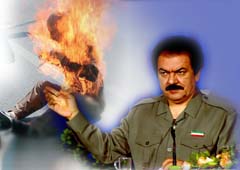Rajavi is the ideological leader and the moving spirit of his cult in both word and deed
The historical warning of the consequences awaiting any group caught up in a certain hate-filled, obsessive ideological infrastructure allows it to dehumanize its opponents and to engage in a war that eventually leads to tragedies that await the opponents, itself and the world in general. The insistence of Massoud Rajavi, the ideological leader of MKO terrorist cult, on clearly defining his animus struggle against the Iranian regime as an ideological war is an indication of strongly moving on the path of an obsessive ideological cult. In fact, MKO’s alleged terrorist operations and plots against Iranian people and interests can be viewed as the beginning of an ideological war through the manipulation of terrorism in order to first achieve certain ideological and then strategic goals.
obsessive ideological infrastructure allows it to dehumanize its opponents and to engage in a war that eventually leads to tragedies that await the opponents, itself and the world in general. The insistence of Massoud Rajavi, the ideological leader of MKO terrorist cult, on clearly defining his animus struggle against the Iranian regime as an ideological war is an indication of strongly moving on the path of an obsessive ideological cult. In fact, MKO’s alleged terrorist operations and plots against Iranian people and interests can be viewed as the beginning of an ideological war through the manipulation of terrorism in order to first achieve certain ideological and then strategic goals.
Rajavi’s latest message to his disciples on the first of May contains a fast review of his organization’s atrocious, cultic activities which will be possibly repeated in the future. Is he really serious in what he has said or he only drew a sketch of his organization’s potentiality; his message could give impetus to his followers to actually backfire by reinforcing their ideological commitment. Marking off his antagonism with Iran under an ideological concept he says: “first of all it should be clarified that this [our] war is an ideological one. … In fact, it is a political-ideological war. It can be elaborated as a political-organizational war, but at its peak, it is an ideological one”.
Although indirectly stated, Rajavi tries to insinuate that the outstanding point about his organization is that noting and no act is done and carried on independently and spontaneously in his organization but is provoked just under the influence of a heavily disciplined, pre-planned and pre-organized order. Of course, in most cases and when acting on a political scene before the outside world, the leaders do their best to exculpate the organization of any allegations of having any role in enforcing the perpetrations. However, underlay is an ideological training that has produced a soldier with the organizational conception of duty and self-sacrifice that plays a critical role in the vast machinery of war.
In the course of the widespread self-immolations in some European countries on June 17, 2003 for instance, a number of the group’s volunteered members committed self-immolations in public to protest Maryam Rajavi’s arrest by the French police. According to MKO’s own reports “16 people attempted to set themselves alight in three days in Paris, Berne, Rome, London, Ottawa, Athens and Nicosia”. The human tragedy, however, is reported to have ended with two deaths; two women, SediqehMojaveri, 44-year-old, and NedaHassani, 19-year-old, died because of the self-immolation injuries.
In a post-immolation meeting with Neda Hassani’s family, Maryam Rajavi did her best to persuade the family that Neda’s death was the outcome of her great devotion and commitment to her leader and thus, on the one hand Neda would be the sole responsible for her own death and on the other hand, it would be Maryam who pocketed the merit of her action. Proven as in the letters of the members volunteered for self-immolation and also in the messages of the leaders all these and other similar suicidal operations have been ideologically justified. To be more exact, Rajavi as the ideological leader has been the true spirit behind the atrocities committed by his devoted apostles and followers.
The important point going unnoticed in MKO’s relations with the insiders and the outsiders is that the Rajavis at the lead of the couple-run organization play two poles of the same magnet; while Massoud Rajavi is the chosen ideological leader to whom all insiders are devoted and follow his order blindly, Maryam Rajavi plays the role of the puppet political leader for the outsiders and to either justify the ideologically perpetrated operations or provided a fertile ground for her husband’s ideologically based plans. The husband’s language is to instigate an ideological mobilization for the creation of a new unconventional, eclectic and arbitrary order; the wife’s language is to exploit European-favored democratic slogans and capacities to drive a disguised ideology and strategy as the ends and means of MKO’s foreign policy. For the insiders and for the outsiders as a whole Rajavi is the ideological leader and the moving spirit of a radical solution in both word and deed.

